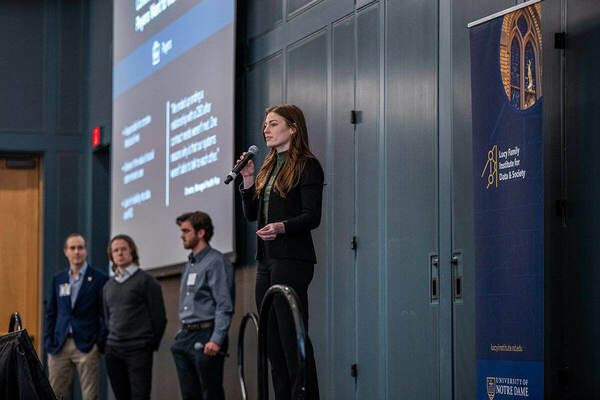A game, not a grind: Notre Dame students develop mobile app to make math fun
Students often say that math is their least favorite subject—too abstract, too much about memorizing rules and formulae, and, frankly, not much fun.
That’s why two Notre Dame students have created an educational, gamified math app, Pi-Squared. Their mobile phone app, designed for students aged 15-18, prepares users for standardized math exams, while also appealing to those who enjoy math puzzles.
David Carr, a student in Notre Dame’s graduate program in entrepreneurship, ESTEEM, and a Naughton Fellow from Ireland, conceived of the mobile app as a tool to motivate students and give them an opportunity to practice math skills anytime, anywhere.
“If you can replace students’ doom scrolling on TikTok and Instagram with learning—either on the bus or in between classes, then that previously wasted time becomes productive,” said Carr.
After five years of working as a math tutor, Carr knew how to prepare students for standardized math tests, but he didn’t have the coding expertise necessary to turn his experience into an engaging, educational app.
Fortunately, Carr met Chris Fakhimi, a master’s student in computer science. Fakhimi’s course on computing-based entrepreneurship and Carr’s class on launching tech startups encouraged collaborative projects—the computer science students furnished the technical know-how, and the ESTEEM students provided the business savvy.
When Fakhimi read Carr’s proposal for the math app, he was hooked.
“I was always interested in making an app—designing and building all the technical features myself, and I enjoy math games and puzzles, so David’s proposal for the Pi-Squared app really appealed to me,” said Fakhimi.
Over a six-month period, Carr and Fakhimi successfully designed, developed, and deployed their app on both iOS and Android platforms.
Pi-Squared covers all the usual high-school math subjects—algebra, geometry, calculus—while offering exam-specific questions, feedback on incorrect answers, daily math puzzles, and time-pressured quizzes to increase engagement.
To gather input on the app’s functionality and overall user experience, Carr interviewed over a hundred teachers and tested the app on more than 300 students. Teachers thought the gamified approach to math was engaging, while students valued the competitive features such as leaderboards. Highlights for students included a Wordle-like feature called the Daily and the app’s Frenzy mode where players satisfy equations by clicking on numbers flying across the screen.
Carr said that the app is meant to enhance rather than replace classroom instruction. By encouraging students to practice math skills, he hopes they will be better prepared to learn college-level math—a perspective shared by those teaching upper-level STEM courses.
“As a university professor, I have talked to students who cite challenges at the high school level—including lack of engagement, lack of resources, etc.—that contribute to struggles in university math, science, and engineering courses,” said Aaron Dingler, associate teaching professor in computer science and engineering.
“Pi-Squared can help get students engaged and excited about math and develop the skills and confidence to help them succeed in their high school and college coursework.”
Latest Research
- University of Notre Dame researchers pitch concepts to advance health deliveryResearchers at the University of Notre Dame are uniting the power of data and venture capital to develop community-centric approaches to care delivery. …
- Julia Spear ‘25 on Joining ESTEEM After Completing a PhD, How a Technical Background Has Supported Her Capstone Work, and What She Loves About South BendJulia Spear came to the ESTEEM Class of 2025 after six years at Notre Dame, during which she completed a PhD in Biomedical Sciences. She was drawn to ESTEEM after realizing the program could help her leverage her technical background for work outside of academia. …
- ‘Who the messenger is matters’: Lakshmi Iyer shows that cultural leaders can positively influence population growthFertility rates across the world have been steadily dropping since 1950. Pinpointing the reasons is at the heart of Lakshmi Iyer's work as a professor of economics and global affairs. Her research exemplifies the kind of population-level research that Notre Dame Population Analytics (ND Pop), a new research initiative at the University, seeks to foster.
- ND Founders Profile #164: Turning waste into opportunity — Ben Moore’s mission to reduce food waste with The Ugly CompanyAfter being discharged from the Army due to an injury, Ben Moore returned to his family’s farm in California’s San Joaquin Valley, a region that produces nearly 80 percent of the fruit and nuts consumed in the United States. However, when his father, a fourth-generation farmer, explained there was…
- American studies professor wins Russell Sage Foundation grant for research on untold Southeast Asian refugee stories…
- Lee Gettler, professor of anthropology, elected fellow of the American Association for the Advancement of ScienceOn Thursday, March 27, the American Association for the Advancement of Science (AAAS) announced the 2024 class of AAAS Fellows including Lee Gettler, the Rev. John A. O’Brien College Professor of Anthropology in the College of Arts and Letters at the University of Notre Dame.











